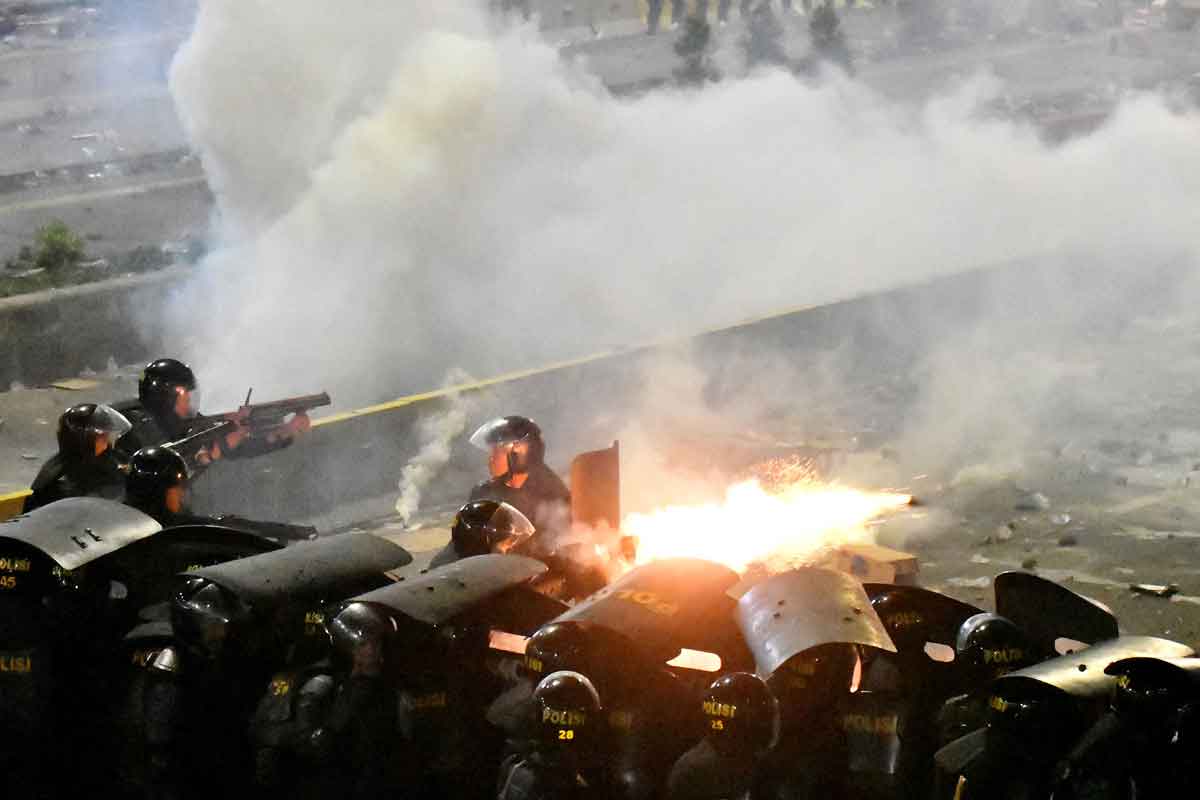Indonesia’s capital, Jakarta, was returning to normal Friday as traffic returned to the centre following two nights of deadly clashes between protesters and police that left seven dead and hundreds injured.
The subdued mood in what is normally a frenetic and noisy urban sprawl of more than 30 million people belies a polarisation in the country that has been building steam for years. The pressure boiled over on Tuesday night in a wave of political violence that hasn’t been seen in the city in decades.
The trigger was the re-election of President Joko “Jokowi” Widodo, who defeated his arch-rival Prabowo Subianto for a second time. Underlying the face-off between the two are tensions over religion, the military and the distribution of money and power that have racked Indonesian politics for decades.
Tens of thousands of police and soldiers remain on high alert three days after the election commission declared Jokowi winner of last month’s election with 55.5 percent of the votes in a process that most observers say was free and fair.
That wasn’t enough to stop Erny Prasatyawaty from traveling more than an hour from the suburb of Depok to join thousands of others on the street in support of the defeated opposition candidate.
“There is no justice and honesty,” said Prasatyawaty, 47, secretary general of Wanita Militan Indonesia, a volunteer women’s group that supports Prabowo. “Massive fraud occurs. We only demand that the system be run fairly, democratically.”
Stoking discontent
Prabowo – a one-time army general and former son-in-law of former dictator Suharto – won nearly 70 million votes, many from traditionally conservative Muslim areas. He set the stage for discontent among supporters when he declared earlier this month that the election was fraudulent. He lodged an official appeal to the Constitutional Court on Friday, something he tried unsuccessfully after his 2014 loss.
“He has this ability to turn the dial up, but not to dial it down,” said Aaron Connelly, a research fellow at the International Institute for Strategic Studies in Southeast Asian politics, noting Prabowo’s coalition was broader than just Islamists. “There are a lot of people in that crowd who really believe Prabowo won the election.”
While many set out to protest peacefully, photographs and video show others arrived in droves deep into the night armed with rocks and bamboo sticks, escalating clashes with police into a violent confrontation with tear gas and rubber bullets that saw more than 250 protesters detained. National Police said on Thursday there was evidence some rioters were supporters of Islamic State, without giving details.
The unrest far outstrips the relatively small protests by Prabowo supporters when he lost in 2014. Then, Jokowi had earned widespread popularity locally for his time as governor of Jakarta.
Sluggish growth
A former furniture salesman, Jokowi’s hands-on approach and public engagement won over Muslim and ethnic groups. But the president’s failure to deliver the seven percent economic growth rate he promised and the rise of increasingly assertive Islamic groups put a strain on the country’s motto, “unity in diversity.”
"It’s an election year and that alone could cause chaos in any country, but it is unfortunately the case in Indonesia that it has used religious issues for political pandering," said Gayle Manchin, vice chair of the United States (US) Commission on International Religious Freedom.
The issue came to a head in 2016 when Jokowi’s ally, Christian governor Basuki Tjahaja Purnama, was accused of an alleged blasphemy of the Quran – drawing more than 150,000 protesters who engaged in violent clashes with the police. Purnama, or Ahok as he is known, later received a two-year prison sentence.
But religious violence has also persisted outside the capital. In 2015, thousands of people – mostly Christians – fled Aceh after an Islamic group burned down a church. Central Sulawesi, meanwhile, has witnessed targeted attacks against Christians.
In a country where 90 percent of the nearly 270 million population is Muslim, Prabowo tapped discontent within the religious community during the election campaign, cultivating his image as a pious Muslim and offering protection for those with the extreme views. He attacked Jokowi for his pluralism.
“Prabowo has made an already polarised community exposed – there’s some elevation of hostility between the two groups that has not been seen before,” said Achmad Sukarsono, a senior analyst at Control Risks.
Muslim interests
The secular divide may force Jokowi to do more to placate Muslim interests as he tries to sell a proposed US$400 billion infrastructure package to boost the economy. He picked Ma’ruf Amin, the country’s most senior Islamic cleric, as his running mate in the election.
Sukarsono said further concessions could include greater restrictions on alcohol, prioritising projects that benefit Muslims, advancing Shariah finance and enforcing halal (permissible or lawful in Islam) labelling on consumable products.
Jokowi must “combine the economic plans with the necessity to negotiate with different forces in the country, and you cannot deny the ties of the Muslim population in Indonesia – you have to be able to address the needs of the majority population first,” Sukarsono said. – Bloomberg
